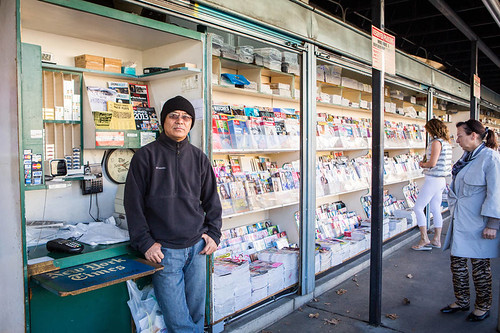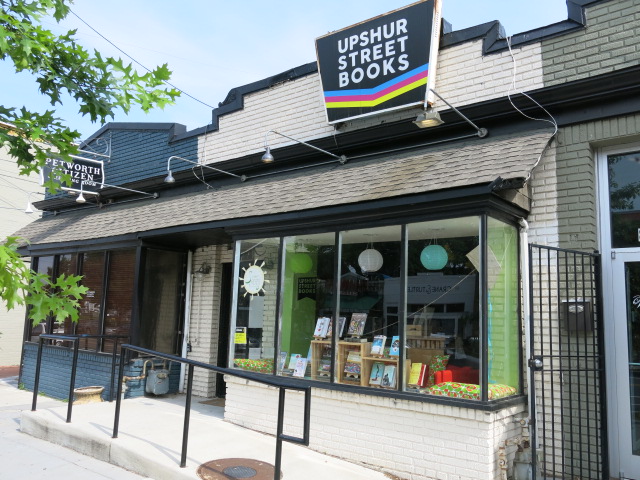Bookstores and New Zealand Book Shop Day, Saturday October 31st
Bookstore days. Riffing off the Independent Bookstore Day in the US, which in turn grew out of California Bookstore Day ("Independent Bookstore Day, May 2nd"), the inaugural New Zealand Book Shop Day is designed to promote patronage of independent bookstores.
According to Booksellers NZ, besides the US event, Australia holds National Bookshop Day and the United Kingdom holds Books are my Bag.
Bookstores as "third places." Bookstores are great good places and are fundamental building blocks of community... even chain bookstores are great places to hang out, read, and hopefully from the standpoint of the managers and employees, for us to buy books and magazines..
Bookstore closures in DC. I have to say I miss the Borders that was in Silver Spring before the company went out of business. It was a major anchor and destination at the heart of their Downtown.
A couple years ago, the Barnes & Noble closed in Union Station ("Barnes & Noble closing in Union Station at end of year," Washington Post) in favor of an H&M, which outbid them for the lease.
More recently, Barnes & Noble announced they would be closing their downtown store ("DC Barnes & Noble closing, leaving no more big bookstores in the city"), their last location in the city. I wish there would be an effort to support their reopening elsewhere in the central business district--even across the street from the Central Library or in a combination. Their Georgetown store closed a few years ago, again because they were outbid by a company willing to pay a higher rent.
And pedaling through Dupont Circle, I noticed that the Books-A-Million store closed also, apparently that happened in July ("D.C. is losing another bookstore," Washington Post) although Kramerbooks & Afterwords Cafe is still going strong.
DC also used to have a number of stores dedicated to the sale of periodicals--magazines and newspapers--but with the rise of the Internet and the decline of newspaper economics, newspapers especially have significantly shortened their distribution chains, so it's very difficult to get "out of town" newspapers anymore, and people just use the Web or apps for news-gathering, so most of these stores have closed. The Post had a story about this earlier in the month, "An old-school D.C. newsstand dies. Another rises to take its place."
Bookstore openings in DC. But in a "bookstore light" kind of move, each new Busboys and Poets comes with a very small book section, now run by the award-winning DC bookstore, Politics & Prose.
Image from the Popville blog.
And as recounted in the blog entry cited above, Warehouse Industries, the restaurant-oriented local business group led by lifelong Washingtonian Paul Ruppert, last year opened Upshur Street Books, a small book store in the Upshur Street commercial district in the Petworth neighborhood, in a location adjacent to three restaurant properties that the company also runs.
Going forward, in big cities why not co-locate bookstores with main libraries? Note that in some of my writings on planning for a new central library, I did suggest ("Civic assets and mixed use: Central Library edition") the possible co-location of "for profit" bookstores such as a Barnes & Noble, Baltimore's Red Emma's Bookstore (a business co-operative bookstore with a radical bent), a news-stand, a booksellers row like the backside of the National Library of Quebec in Montreal, or other independent operations.
 In Montreal, the Bibliothèque et Archives nationales du Québec has set up the back side of its building to accommodate small booksellers, which they call the Allee des Bouquinistes.
In Montreal, the Bibliothèque et Archives nationales du Québec has set up the back side of its building to accommodate small booksellers, which they call the Allee des Bouquinistes.DC doesn't have the population density necessary to support outdoor news-stand kiosks like they have in New York City (I remember the same types of stands in Detroit, when I was very young, back when Detroit had more than 1.5 million residents), but an "outdoor" newsstand would be really cool integrated into the facade of the Martin Luther King Library downtown, at the building corner at 9th and F Streets.

Marck's Brentwood Newsstand, Los Angeles.
Bookstores in France, the UK and Ireland. According to the New York Times ("Assessing the Health of Independent Bookshops"), after a precipitous number of store closings in the US, the number of new shops is increasing, while in the UK and Ireland the number of bookstores continues to decline, while in France, bookstores remain successful ("French Bookstores Are Still Prospering," New York Times) supported by various government efforts, including maintaining "manufacturers suggested retail prices" for online booksellers ("France Takes Aim at Amazon to Protect Local Bookshops," New York Times).
Labels: formula retail, retail, urban design/placemaking





13 Comments:
I have noticed this ever since visiting London and seeing bookstores and other such businesses nearby the British Museum and national library- the city in DC makes zero effort to capitalize on the proximity to major national assets such as the LOC or even local libraries. I am very disgusted by the closure of bookstores almost as much as the disappearance of public clocks-which is basically a loss of good urban furniture- in Europe they still keep public clocks while we have removed most of ours. It is convenient to have them and as someone who does not wish to own a cellphone I for one use these clocks.
Nobody buys books in stores anymore. Its not the city's role to pick retail. If there was a market for it such stores (or kiosks, or trucks) would appear but sadly it appears not.
all retail is hurting, even chains. If you want retail in your community and you recognize that as Alex Wall says, "commerce is the engine of urbanism" then you have to deal with it, support it, and sometimes subsidize it.
I meant to mention in Montreal they have a lot of bookstores and newsstands, but that's because many of these stores focus on French language periodicals and books, which in Canada, except in Quebec, are harder to find than English materials.
So there "planning support" isn't needed.
Here, planning support is needed for a variety of retail categories, as I have written about for years and probably have a few hundred entries on various elements of the issue, e.g., http://urbanplacesandspaces.blogspot.com/2007/06/retail-action-strategy.html and http://urbanplacesandspaces.blogspot.com/2009/09/commercial-retail-rents-2.html
I buy most of my books in bookstores because I prefer to browse for books. Regardless, a couple things to note.
There was an interesting article I believe in the NYTs about how the Strand stays relevant and the ways the family has re-invented that store and extended its brand and distribution, including a more robust website. Worth looking for.
Secondly, one of the things I think that is hurting B&N is the corporate disconnect between its bricks and mortar and website. There is no price parity for instance. I find that I still reserve books online to pick up in the store. Because I'm impatiet and also like the chance to go browsing, but it always kills me that I pay so much more in store. The Gap is boosting its in store sales but increasing the connection between the stores and the website, including on price and inventory search.
Third point, SF has two locations with bookstores. These are used books pulled from the collection and the income goes to Friends of the Library. They are called the Readers Bookstore. They have had this store at Main Library since at least the late 1990s and perhaps earlier. The second location is newer.
lots of people buy books in real stores- that anon commenter is yet another hostile person trying to be weird. People in many specialty fields need to see books and artists and other craftsmen need to actually see the reproductions and their quality first hand- there is no online way to do this properly. Some forms of printing are not translatable to online media, either.
Christopher -- thanks for that, and the id'ing of the stores in SF libraries. I'll have to look into it.
http://www.cnbc.com/2015/11/03/amazons-next-chapter-opening-a-physical-bookstore.html
I'm surprised you didn't bring up the sales tax, books (like groceries) should be exempt.
that's why I need you, to point out things that I miss.
Speaking of, I remember in Michigan, periodicals--newspapers for sure, I don't remember about magazines--were tax exempt, but I don't think books were.
(Borders started in Ann Arbor, and I remember it fondly, long before they ever had a second store, let alone hundreds.)
2. I did see the amazon thing on RetailWire. There the commentators were mixed, mostly thinking it's a good idea, but mostly about presenting the various Amazon devices, likening it to an Apple Store.
The thing is that computers and phones are expensive--hence Apple Store has the highest sales per s.f. of any typical retail store, 10x to 20x otherwise well performing stores.
But I don't think that's a reasonable comparison.
Plus, bookstores are third places, and I don't think it's the same to read a review on the shelf, as it is to have an author talk, and recommendations from people.
I don't see how Amazon could really make these third places.
Especially because what attracts the bibliophiles aren't likely the books that are the best sellers at Amazon, although it's hard to say.
3. one of the commentators has his own consulting practice called the Shopper Scientist, and so I read some of his pieces on what he calls "parked capital" and how most products in a store don't sell.
He made the point that by focusing on the top sellers, an Amazon store is also going to theoretically have good retail inventory velocity.
... if the people who go to the store to buy are the same kind of people who are buying the "best sellers."
I am probably the end of the long tail in terms of the books I buy, "esoteric" books on public space and urban studies.
This anon commenter isn't trying to be "weird", just observing the reality of tech and social change. That said, I used to work for a scientific and technical book store. Places with very specific niches will stick around, but even those, if they aren't in a very specific place, if they don't ship and have an online presence their days are numbered.
I still buy books when I travel as souveniers, and planning/architecture books. I read non-fiction, but not novels, and most of it is read-once-and-done. No need to keep it on the shelf, and subsequently schlep it throughout my life. Kindle is good for that, or I buy used or get it from a library.
Well I was referring more to amazon evading taxes, driving competitors our of business, then entering the same market.
http://arstechnica.com/business/2015/11/amazons-first-brick-and-mortar-store-one-big-ad-for-the-amazon-app/
Right. I caught that. I was thinking we should do the reverse. Tax the online sales, and make the in-store sales tax free.
Of course, the problem is that most jurisdictions (not DC nor Maryland counties) are fully dependent on property tax and sales tax as the only major sources of tax revenue in their jurisdiction. (DC keeps its income tax and the 'state" income tax in Maryland is split 50/50 between the local jurisdictions and the state.)
reiters was awesome. and yes, we need both online and in-store. not being particularly wealthy, and buying a lot of older books that wouldn't still be in a bookstore, I do buy a lot of titles online.
Thank you for providing such valuable information and thanks for sharing this Business Promotion technique.
Post a Comment
<< Home